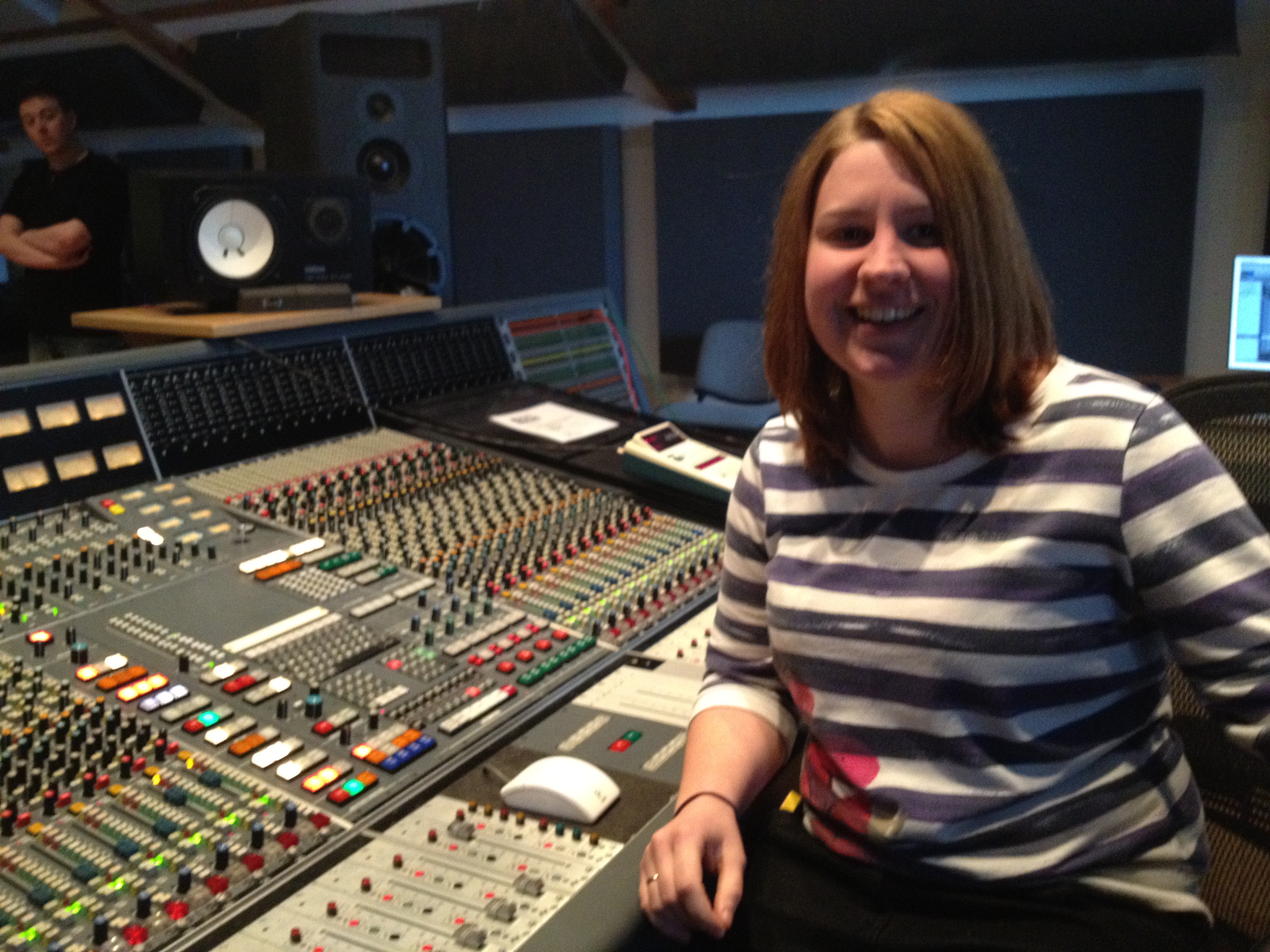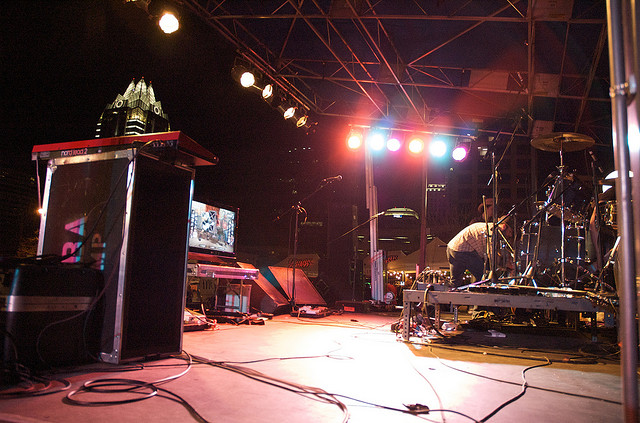provides award winning courses and training in audio engineering, music production and creative media. Now an international institution with over 30 years of history, SSR produces graduates around the world for the music, television, film, radio and games industries.
SSR will be providing regular blog entries for The Unsigned Guide focusing on working in the industry, music recording and production tips and other related topics.
------------
Vicky Batrak is a Manchester based freelance sound engineer who trades under the name of Little Door Audio. Vicky is a graduate of SSR Manchester’s Audio Engineering Techniques & Technology course. This is her story from graduating to setting up Little Door Audio.
 Hi Vicky, what have you been up to since graduating from SSR?
Hi Vicky, what have you been up to since graduating from SSR?In February 2011 I did my first properly paid audio engineering job, working as a sound assistant in London for 9 days on the HMV Next Big Thing Festival. As soon as I returned to Manchester I registered as a freelance sound engineer, and from the contacts I made on the job in London I was offered other work and was also able to do some shadowing which then lead to further paid work.
How did that initial work experience lead to further opportunities?
Since that initial job I’ve worked on various TV shows, radio programmes and other projects including Countdown (sound recording), XFM’s Winter Wonderland at the Manchester Apollo featuring Chase & Status & Ed Sheeran (broadcast assistant), ‘Tool Academy’ on Channel 4 (sound recording) and a BBC 5 Live drama about Sir Bobby Robson ‘Don’t Cry For Me Argentina’ featuring Denise Welsh and Tim Healey (recording). I also assisted with the recording of the Co-Operative group’s charity single which was released on iTunes, and have recorded and produced for various local bands whose music has been aired on stations like BBC 6 Music. This summer I’ll be working on the Olympics as a commentary control room operator.
What is your connection with SSR?
From 2007 to 2009 I studied audio engineering techniques and technology and live sound engineering at SSR in Manchester. Since finishing my studies at SSR I have worked there as a studio assistant and receptionist, using the access I have to the studios to work with bands, solo artists, poets, and film makers, etc. The work I do at SSR runs in conjunction with my other freelancing work.

Did you have any previous experience or knowledge before starting the course?When I started the course at SSR I had no experience of sound engineering at all. I’d never used a mixing desk, never heard of Pro Tools, and didn’t know anything about microphones. Over the course of two years studying studio, live and post production sound I learnt and built upon the skills needed to work as a sound engineer. I can now quite comfortably go into an unfamiliar studio and apply my knowledge to the situation in order to run a successful session.
How has your training helped you get work in the industry?
I think studying at media institutions like SSR is a very beneficial route to take. The skills I’ve learnt through study have provided me with a very strong foundation upon which to built and add to through work experience. Without the tuition I received at SSR I’m not sure I would be in the situation I’m in now, doing the work I have been lucky enough to do.
Having said that, skills alone don’t get you work, just as having contacts doesn’t guarantee continued work. If you have great technical knowledge but are always late or are a poor communicator then it’s unlikely that you’ll be asked to do more jobs. Similarly, if you are a friendly person who gets along with everyone you’re working with, but have no idea how to do the job then someone else may be picked over you for future work. You definitely need a good balance of the two. I always work hard to ensure that I’m punctual, polite, and friendly, and that I continue to develop and improve upon the skills I learned at SSR.
Can you tell us a little about Little Door Audio?
As I began to gain more regular work, following my first properly paid engineering job, I decided that I wanted to establish and present myself much more professionally as a sound engineer. So, in September 2011 I decided to begin working under a trading name and I established Little Door Audio.
What process did you have to go through to set up your trading name?
It didn’t cost me anything to start trading under a different name, and nothing changed in terms of tax or national insurance payments owed when I decided to become Little Door Audio. I came up with the name, my brother designed a logo for me, I created a website and had some business cards printed. The idea of using a trading name is simply to add a sense of professionalism. If someone asks for your contact details and you hand them a card it looks far better than quickly scribbling your details on a scrap of paper. Add to that a personalised email address rather than a standard hotmail or gmail address and things look even better. It helps to show your potential customers that you’re organised, that you’re established and professional. It’s your job, it’s not just something that you do every now and again.
Similarly if I’m applying for a job and the company asks for my CV I can instantly direct them to my website where they can quickly and easily download a copy. Again, this shows professionalism, organisation and efficiency. Plus, the website allows me to provide them with extra information, like testimonials from past clients, which hopefully they will read through when they go to the site to download my CV. This is what I did when contacted about the Olympics.

Has this led to an increase in job opportunities?It’s difficult to say whether or not I’ve gained extra work since trading under Little Door Audio. In all honesty, I’ve probably not. In this industry you gain more work from contacts, recommendations, and from doing a good job so that people want to work with you again.
Using a trading name, however, helps you to become more memorable. People are more likely to remember ‘Little Door Audio’ and the red door and sound waves of the logo than they are my name. It helps to create an identity and a brand that hopefully people can associate you with. People often refer to Little Door Audio as a company. It’s not a registered company; it’s simply a trading name, but clearly the professional way in which I present myself, combined with the name, leads people to think it’s a bigger outfit. It’s just me! I take care of all aspects of it. Just like all freelancers, I do all the income and expenditure, my tax returns and national insurance payments. I take care of all the marketing. I update the website as regularly as I can, as well as all the social network sites. I design the business cards and any flyers or posters to advertise myself. I negotiate the rates of pay for jobs that I do and draw up letters of appointment and agreements of work. I write up and send out my invoices and receipts. And ultimately I do the job, working as a sound engineer in different environments.
Is it easy being self employed?
At times, being freelance is difficult and it’s easy to be misled or caught out. Sometimes you have to work with difficult people. Just because someone says they will pay you a certain amount of money for a job doesn’t mean they will actually honour that when the job is completed. You quickly learn that you need to outline what the job is and what the rate is then have all this in writing prior to the start of the job, so that there is no confusion about what’s going to happen. Make sure this is signed by yourself and the client too to show that they did actually agree to what’s been said. Never presume that someone knows about something, and never presume you know what they want… always ask. Lack of communication can lead to misunderstandings which can result in disputes. The more you can confirm in writing before starting work the better. For example, you may agree a rate of pay for a certain number of hours, but what happens if a session runs over and you have to stay later? You can’t simply presume that you will be paid, because the client could simply say ‘well I never said I’d pay you extra if we stayed longer’, and you would have nothing to dispute that.
Would you prefer a 9-5 job?
It can be difficult and very stressful and I know of a lot of engineers, including myself, who occasionally consider if they are in the right job. Should we not just pack it all in and get a secure 9-5 where we don’t have to negotiate rates, we have a boss to complain to if we have a dispute, and we get holiday pay? Sometimes that feels like a better option but then you’ll get a great job that goes really well and confirms why you love doing what you do. I’m constantly learning and developing things as an engineer and as a freelance business person.
How important are admin and soft skills compared to technical skills?
Learning about a better microphone technique is just as important as learning about a better way to write up an agreement of work. Being a freelancer does require a lot of skills and you do need to wear a few hats. I never pretend to know it all but I continually try to improve the service I provide. I’ve still got a long way to go before I’m fully established as a freelance sound engineer, and I hope eventually Little Door Audio will be a recognised and well respected name within the world of audio engineering.
What would you say to people looking to set themselves up in the music or media industries?
If you have no previous experience I think a professional, dedicated training course and/or securing some valuable work experience or shadowing opportunities would be a good place to start, then when you have the technical skills think about your career aims and options. I think in the world of sound engineering freelancing seems to be the main way to go. Secure, salaried recording studio jobs are very, very few and far between. But if you’re able to adapt and work with lots of different people and companies, then you’ll have more options and hopefully more job opportunities. That’s what I’m aiming for anyway!
You can find out more about Vicky and Little Door Audio by visiting , follow her on Twitter or connect on Facebook at .
school of sound recording, ssr, sound engineering, little door audio, music careers, audio engineering

 Hi Vicky, what have you been up to since graduating from SSR?
Hi Vicky, what have you been up to since graduating from SSR?







